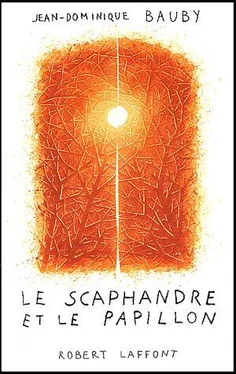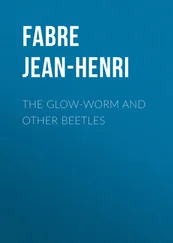The second time I went to Paris, four months later, I was unmoved by it. The streets were decked out in summer finery, but for me it was still winter, and what I saw through the ambulance windows was just a movie background. Filmmakers call the process a “rear-screen projection,” with the hero's car speeding along a road that unrolls behind him on a studio wall. Hitch-cock films owe much of their poetry to the use of this process in its early, unperfected stages. My own crossing of Paris left me indifferent. Yet nothing was missing—housewives in flowered dresses and youths on roller skates, revving buses, messengers cursing on their scooters. The Place de l'Opéra, straight out of a Dufy canvas. The treetops foaming like surf against glass building fronts, wisps of cloud in the sky. Nothing was missing, except me. I was elsewhere.
“On June 8 it will be six months since my new life began. Your letters are accumulating on the dresser, your drawings on my wall, and since I cannot hope to answer each one of you, I have decided to issue these samizdat bulletins to report on my life, my progress, and my hopes. At first I refused to believe that anything serious had happened. In my semiconscious state following the coma, I thought I would shortly be back in my Paris stamping grounds, with just a couple of canes to help me along.”
Those were the first words of the first mailing of my monthly letter from Berck, which I decided in late spring to send to my friends and associates. Addressed to some sixty people, that first bulletin caused a mild stir and repaired some of the damage caused by rumor. The city, that monster with a hundred mouths and a thousand ears, a monster that knows nothing but says everything, had written me off. At the Café de Flore, one of those base camps of Parisian snobbery that send up rumors like flights of carrier pigeons, some close friends of mine overheard a conversation at the next table. The gossipers were as greedy as vultures who have just discovered a disemboweled antelope. “Did you know that Bauby is now a total vegetable?” said one. “Yes, I heard. A complete vegetable,” came the reply. The word “vegetable” must have tasted sweet on the know-it-all's tongue, for it came up several times between mouthfuls of Welsh rarebit. The tone of voice left no doubt that henceforth I belonged on a vegetable stall and not to the human race. France was at peace; one couldn't shoot the bearers of bad news. Instead I would have to rely on myself if I wanted to prove that my IQ was still higher than a turnip's.
Thus was born a collective correspondence that keeps me in touch with those I love. And my hubris has had gratifying results. Apart from an irrecoverable few who maintain a stubborn silence, everybody now understands that he can join me in my diving bell, even if sometimes the diving bell takes me into unexplored territory.
I receive remarkable letters. They are opened for me, unfolded, and spread out before my eyes in a daily ritual that gives the arrival of the mail the character of a hushed and holy ceremony. I carefully read each letter myself. Some of them are serious in tone, discussing the meaning of life, invoking the supremacy of the soul, the mystery of every existence. And by a curious reversal, the people who focus most closely on these fundamental questions tend to be people I had known only superficially. Their small talk had masked hidden depths. Had I been blind and deaf, or does it take the harsh light of disaster to show a person's true nature?
Other letters simply relate the small events that punctuate the passage of time: roses picked at dusk, the laziness of a rainy Sunday, a child crying himself to sleep. Capturing the moment, these small slices of life, these small gusts of happiness, move me more deeply than all the rest. A couple of lines or eight pages, a Middle Eastern stamp or a suburban postmark…I hoard all these letters like treasure. One day I hope to fasten them end to end in a half-mile streamer, to float in the wind like a banner raised to the glory of friendship.
It will keep the vultures at bay.
Stifling heat. But I would like to get out. It has been weeks, perhaps months, since I last left the hospital grounds for my wheelchair ride on the promenade along the shore. Last time it was still winter. Icy gusts whipped up clouds of sand, and the few thickly muffled strollers leaned purposefully into the wind. Today I would like to see Berck in summer attire, to see the beach—which was deserted all winter—packed with carefree July crowds. To reach the street from Sorrel, one has to cross three parking lots, whose rough, uneven surface sorely tries the buttocks. I had forgotten how grueling this route was, with its puddles and its potholes, its cars inconsiderately parked on the sidewalks.
And then at last the sea. Beach umbrellas, sailboats, and a human rampart of swimmers complete the postcard effect. A vacation sea, gentle and unthreatening. Nothing like the steel reflection visible from the hospital terraces. And yet these are the same troughs, the same swells, the same misty horizon.
We thread our way through a moving forest of ice-cream cones and crimson thighs. Easy to imagine licking a drop of vanilla from young, sun-reddened skin…No one pays me any real attention. Wheelchairs are as commonplace at Berck as Ferraris at Monte Carlo, and poor dislocated wheezing devils like me are everywhere. This afternoon, Claude (the young woman to whom I am dictating this book) and Brice are with me. I have known Claude for two weeks, Brice for twenty-five years. It is strange to hear my old partner in crime telling Claude about me. My quick temper, my love of books, my immoderate taste for good food, my red convertible—nothing is left out. Like a storyteller exhuming the legends of a lost civilization. “I didn't realize you were like that,” says Claude. My present life is divided between those who knew me before and all the others. What kind of person will those who know me now think I was? I do not even have a photo to show them.
We stop at the top of a big stairway that goes down to the beach bar and to a long line of pastel-colored cabanas. The stairs remind me of the entrance to the Porte d'Auteuil metro station in Paris. I used to climb them as a child when returning from the old Molitor swimming pool, my eyes red with chlorine. The pool was demolished a few years ago. As for stairs, they are now just dead ends for me.
“Want to turn back?” asks Brice. I protest, shaking my head vigorously. No question of turning around until we have reached our real goal. We move quickly past an old-fashioned wooden carousel, whose shrieking calliope pierces my eardrums. We pass a well-known hospital character we call “Fangio.” Tall, dark-haired, athletic-looking, Fangio is rigid as a poker. Unable to sit, he is permanently condemned to either a vertical or a horizontal position. He gets about at amazing speed, lying flat on his stomach on a vehicle he operates himself, parting the crowds with yells of “Look out—here comes Fangio!” I know who he is, but who is he really? I have no idea. Finally we reach the farthest point of our journey, the very end of the promenade. I have not insisted on coming all this way just to gaze at the flawless seascape. I have come to gorge on the aromas emanating from a modest shack by the path leading away from the beach. Claude and Brice bring me to a halt downwind. My nostrils quiver with pleasure as they inhale a robust odor—intoxicating to me but one that most mortals cannot abide. “Ooh!” says a disgusted voice behind me. “What a stench!”
But I never tire of the smell of french fries.
That's it—it's come back to me. The horse's name was Mithra-Grandchamp.
Читать дальше












